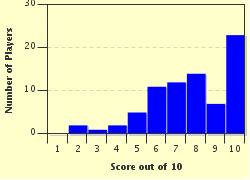Quiz Answer Key and Fun Facts
1. This man, who was a general-in-chief for the Confederate forces at the end of the American Civil War, definitely fulfilled his duties. He remarked that "duty then is the sublimest word in the English language. You should do your duty in all things. You can never do more, you should never wish to do less." Who is he?
2. This Union general, well known for his destructive march through Georgia, once said that "it is only those who have neither fired a shot nor heard the shrieks and groans of the wounded who cry aloud for blood, more vengeance, more desolation. War is hell." Who is he?
3. This Union general, nicknamed "Young Napoleon", was not known for his humility. Upon receiving his promotion to commander of the Army of the Potomac he stated that "by some strange operation of magic I seem to have become the power of the land." Who is he?
4. This Confederate general, known as "Lee's War Horse", learned of the death of Ulysses Grant in 1885. When he commented about it he simply asked, "Why do men fight who were born to be brothers?" Who is he?
5. At Fort Donelson, this Union general responded to the Confederate request for an agreement in such a way that "Unconditional Surrender" was hereafter associated with him. He stated that there were "no other terms than unconditional and immediate surrender. I propose to move immediately upon your works." Who was this man, who later went on to become president?
6. This Confederate general was the highest ranking person on either side of the American Civil War who was killed in battle. He stated that "we can be annihilated, but we cannot be conquered." Who is he?
7. This Union general is perhaps best known for his heroism as a lieutenant colonel in Gettysburg with the 20th Maine in a daring bayonet charge. He said that "we know not of the future, and cannot plan for it much". Who is he?
8. This Confederate general, nicknamed "Stonewall", spoke to the Virginia Military Institute cadets in March of 1861. He said that "the time for war has not yet come, but it will come, and that soon; and when it does come, my advice is to draw the sword and throw away the scabbard." Who is he?
9. This dashing Confederate cavalry general was the eyes and ears of General Lee's army. He stated, "Believe that you can whip the enemy and you have won half the battle." Who is he?
10. This flamboyant Union general, who would later die at Little Bighorn in Montana, was a cavalry commander during the Civil War. He stated that: "I would be willing, yes glad, to see a battle every day during my life." Who is he?
Source: Author
stephgm67
This quiz was reviewed by FunTrivia editor
bloomsby before going online.
Any errors found in FunTrivia content are routinely corrected through our feedback system.


